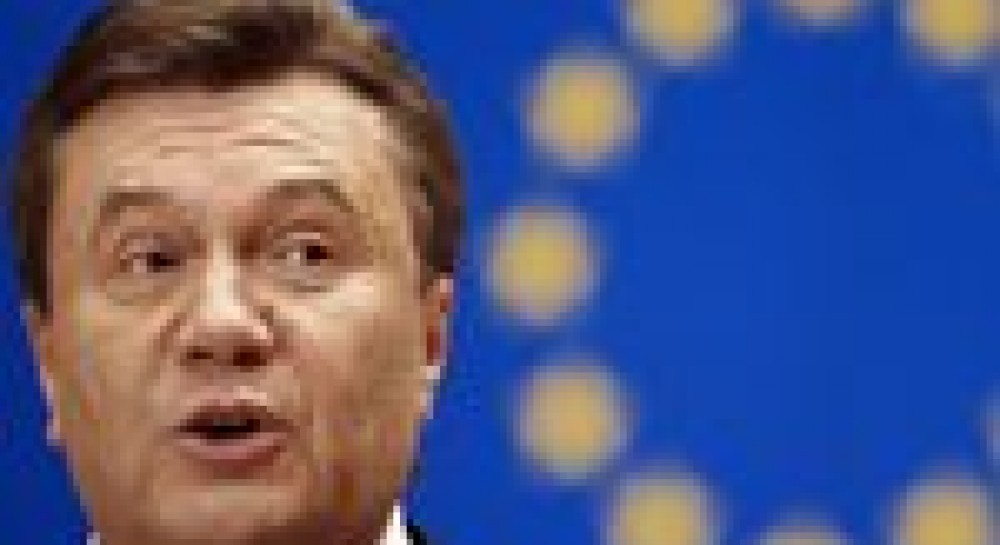
Yanukovych’s 2012 challenge
On the foreign policy front, Ukraine is in muddied waters with both the EU and Russia. Ukraine is desperately trying to find an exit strategy from the “gas contract from hell” negotiated been former Prime Minister Yulia Tymoshenko...
Ukranian President Viktor Yanukovych must come up with a clear, strategic plan as soon as possible in order to face the country`s political and economic challenges, says Amanda Paul of the European Policy Centre in Brussels.
"Ukraine enters 2012 facing many challenges but some opportunities too. Co-hosting the 2012 Euro Football championship with Poland offers Ukraine’s leadership a golden opportunity to showcase the country. However, at the same time, Ukraine faces serious problems both domestically and in its foreign policy, which require a coherent, dynamic and strategic approach.
On the foreign policy front, Ukraine is in muddied waters with both the EU and Russia. Ukraine is desperately trying to find an exit strategy from the “gas contract from hell” negotiated been former Prime Minister Yulia Tymoshenko and Russian Prime Minister Vladimir Putin in 2009 which has left Kyiv now having to pay $515 per 1000 cubic metres. Meanwhile, the EU has, to all intents and purposes, issued Ukraine with an ultimatum if it want to progress with its EU integration process.
With concerns over the prosecution and imprisonment of Tymoshenko and other members of her former cabinet, and an erosion of democratic standards (recently underlined in the 2011 Freedom House report), the EU – for rightly or wrongly - has told Ukraine the following: If you want to proceed to the signature and ratification of the Association Agreement and integrated Deep and Comprehensive Free Trade Agreement which the partners finalised in December 2011, you must improve democracy, the rule of law, etc.
The main litmus test will be Ukraine’s 28 October Parliamentary elections. If they do not meet the international standards (or come close) it seems unlikely that the EU will sign the agreement.
While this situation represents a big headache for Ukrainian President Viktor Yanukovych, at the same time he is also preoccupied with state of Ukraine’s economy and how it may affect voters. Ukraine’s economy has been in trouble since 2008 and remains extremely vulnerable. While GDP growth was 5.3% in 2011, according to a statement by Prime Minister Mykola Azarov at the end of November, it is set to shrink in 2012. This is partially due to Ukraine`s economy being dominated by steel exports, making it volatile to global demand fluctuations.
The EU, with its shrinking economy and recession, is one of its main export markets. The situation was exacerbated in 2011 by a rupture in relations with the International Monetary Fund (IMF) when a $15 billion loan was frozen as a consequence of Yanukovych refusing to increase the price of household gas. The deteriorating economic-social situation has contributed to his drop in support.
In an effort to turn Ukraine’s financial woes around, and give him something to “sell” by the elections, Yanukovych has moved Valeriy Khoroshkovskiy from Ukraine’s Security Service to head the Ministry of Finance, replacing the beleaguered Fedir Yaroshenko.
Khoroshkovskiy, who was economy minister between 2002-2004, has a reputation of being efficient and well-organised and during his time as Head of the SBU drug trafficking was reduced, border management improved and significant efforts were made in the fight against organised crime, as reported in the EU’s assessment of Ukraine’s progress towards a visa-free regime.
Furthermore, as a trusted ally of the president, he has been given almost carte blanche to do whatever is necessary breath new life back into the economy and drive forward economic reforms.
His first foreign visit, on 24 January, is to the IMF where he hopes to find a compromise solution to current deadlock. Having the IMF money will immediately offer Ukraine some breathing space. However, the IMF have already made it clear that there will be no short cuts and it seems unlikely that the decision regarding gas prices will be reversed.
With spring around the corner and Ukrainian’s becoming more savvy on home insulation, a rise later in the spring should not be totally ruled out. After the IMF, it is rumoured that Khoroshkovskiy will travel to Brussels to give EU top brass a “heads up” on his plans.
Indeed Khoroshkovsky will have to work around the clock to meet Ukraine’s economic challenges and make inroads into his list of priorities which seem to include bringing order to Ukraine’s public finances, stamping out programmes that do not bring an increase in GDP, prioritising programmes related to reforms and stepping up efforts to attack corruption and reduce Ukraine’s massive grey economy.
There is also an urgent need to take steps to improve Ukraine’s investment climate in order to make it friendlier for foreign investment and for home-grown entrepreneurs. This could include taking another look at Ukraine’s new, yet controversial, tax law and amending property rights.
Khoroshkovsky’s appointment may be the first of a wider government shake-up with other senior positions likely to change in the near future in the hope of shoring up more public support and try to un-do some of the mistakes of the past. This will not be easy as Ukraine’s leadership is on a very slippery slope."
Amanda Paul is policy analyst and programme executive at the European Policy Centre in Brussels. The following was sent exclusively to Euractiv.Originally posted at Euractiv - http://www.euractiv.com

